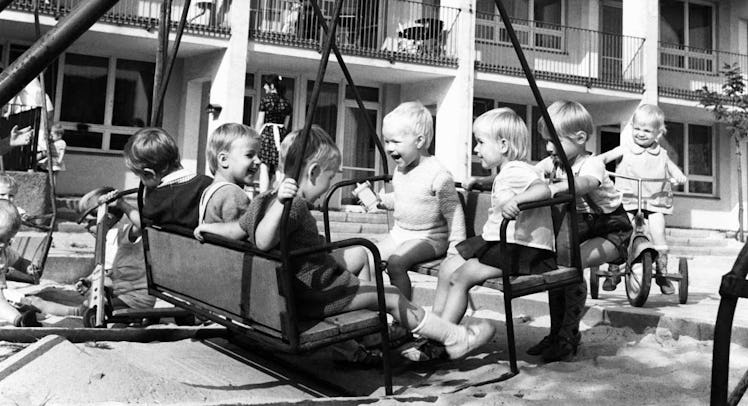Preschool is Great But Unnecessary
Research shows preschool is good for kids, but so is intentional parenting at home.

Preschool exists in a liminal space of scattered toys and varied expectations. Educators stress that Pre-K education is highly recommended for all 4-year-olds, but it’s not required. Outside of a handful of states, public funding for Pre-K is only available to poor parents. That leaves the majority of parents with three options: Send the kid to a “high-quality” preschool at cost of up to $1,000 a month, choose a cheaper preschool or daycare and feel weird about it, or opt out. The first option puts parents under financial pressure, the second puts them under slightly less financial pressure, but potentially at a disadvantage, and the final options puts them in the tough position of having to prep a kid for Kindergarten. The decision is hard and made harder by the popularity of preschool agitprop, which insinuates or outright claims failure to invest in preschool dooms kids forever.
Fortunately, that’s not true. Kids are more resilient than they get credit for and most parents are, when they need to be, remarkably capable teachers.
Much of the parental preschool panic that occurs as a kid hits three-years-old is the unintended consequence of early childhood education advocates. Groups like the National Education Association, for instance, are pushing for the noble goal of publicly funded pre-K for every four-year-old in the country. It’s not a terrible idea, but the research they’re funding to support it is a bit frightening in the absence of a real public policy. Several longitudinal studies have shown preschool has an outsized effect on educational outcomes for economically challenged kids. These studies have been the focus of argumentation because federally funded Pre-K will only become a reality when a consensus is reached on the value of such a program.
In the meantime, the anxieties of engaged parents are being left unsupervised.
“I think every kid deserves a place where they can be challenged and helped along in their development,” says American Academy of Pediatrics spokesperson and Cook Children’s Hospital pediatrician Dr. Justin Smith. “For certain families that might be best done at home. For certain families that might be best done at a more formal preschool.”
For Smith, the important thing is that a kid is challenged. He stresses that this doesn’t require enrolling them in a “hot box where teachers are trying to make them geniuses.” Instead, he suggests that challenge should be understood in terms of exposure to new experiences, sights, sounds, language and activities. Every time a kid experiences something new, plays with a toy that shows cause and effect, hears a book or is asked to identify a number, they’re building their foundational neural network that allows them to build more knowledge as they get older. It’s not all about education policy. Biology matters as well.
This does not have to occur in a super structured learning environment, it can also occur in a home. But it really depends on what a family can provide their kid.
“In situations where a parent has less time or less skills to engage their kid, those may be the kids who would benefit more from a preschool environment,” Smith says. He suggests that’s why there’s been a tremendous push for expanding programs like Head Start. But, he cautions, it’s not as if those from financially stable homes that traditionally don’t benefit from subsidized programs are somehow more capable. “It doesn’t always mean they have the skills or time to help their kids. So those kids may need preschool as much as anyone else.”
And that is the case for preschool: It provides a space for kids to be consistently challenged when parents are unable to (or choose not to) do be challenging all the damn time. Paradoxically, it’s also why preschool is unnecessary: It does nothing a parent can’t (except providing that same parent with peace of mind).
“Different parents have different goals for kids coming out of preschool,” Smith says. “You have to strike some balance between letting them learn at their own pace and putting them through some rigorous program with the desired outcome of making them head and shoulders above the rest when they start.”
As for parents being able to provide the necessary academic support to start Kindergarten, Smith says that as long as the parent has worked with the kid, he or she will likely be on par with their peers by the end of their first year of public school education. That said, Smith notes that parents who opt out of preschool should also be sure to provide opportunities for socialization.
In the end, Smith urges parents to not stress out about the preschool decision, because it’s possible that the stress could be more damaging than any benefit that comes out of the final decision. “Kids are pretty resilient. You’re making the best decision that you can,” he says. “If you don’t think school is the right choice, I think the worst thing you do is feel guilty about that. I would hope parents could feel empowered to teach their child what they need to know to start kindergarten.”
This article was originally published on